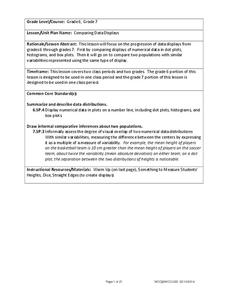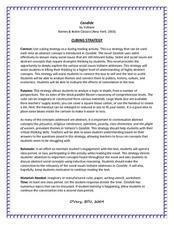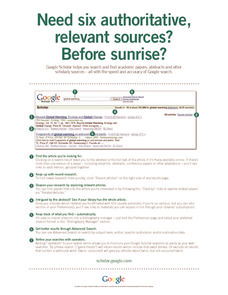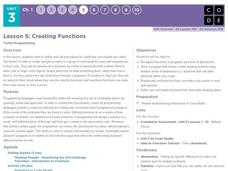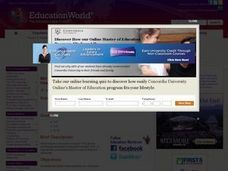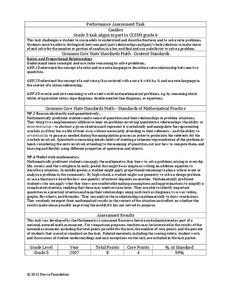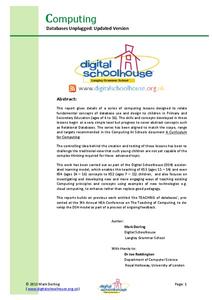Dick Blick Art Materials
Insoluble Paintings
Insolubility and density? Yup, it's art class, of course. To create insoluble paintings that continually move and change, kids mix water-based paint with mineral oil and seal the mixture in laminating pouches.
West Contra Costa Unified School District
Comparing Data Displays
There is so much more to data than just numbers, and this resource has learners use three methods of comparing data in a multi-faceted lesson. The 21-page packet includes a warm-up, examples, an activity, and assessment for a...
MARS - Mathematics Assessment Resource Service
Applying Properties of Exponents
The properties of exponents are all linked together and it is your mathematicians' job to discover and apply those rules. The comprehensive lesson begins with a pre-assessment task to check for prior knowledge and then goes into a...
West Contra Costa Unified School District
Search and Rescue Activity
Get your classes moving and practicing sequences at the same time! Learners move about the room solving problems and finding their solutions. Problems include both recursive and explicit formulas and both geometric and arithmetic sequences.
Curated OER
Candide Cubing Strategy
Candide is a dense text. To assist in analyzing Voltaire's satire, groups employ a cubing strategy based on Bloom's taxonomy. Complete directions for the strategy, a template for the cube, a worksheet, and a topic list are included.
Code.org
Functions and Top-Down Design
Let me break it down for you! Introduce your class to a way of breaking up a complicated task into its component pieces. Individuals draw a complex figure using JavaScript and then break it down to help determine the...
Hawaiʻi State Department of Education
Color Moods
Can art be a mode of communication? You bet it can! Learners explore how colors are used to convey mood in art. First, the class listens to three very unique musical selections that convey three different moods. Then, they compare...
Google
Need Six Authoritative, Relevant Sources? Before Sunrise?
Is your class beginning a project? Here's a template that shows researchers how to use the features of Google Scholar. Directions for how to use Advanced Search, Operators, and Bibliography Manager, as well as how to locate affiliated...
Curated OER
Parts of Speech
Nouns, verbs, pronouns...they're all covered here! This presentation gives a detailed look at each part of speech, but know that you cannott skip slides or start at any slide except for the first. Create a guide to keep your class...
Iowa State University
A Model of Learning Objectives (Revision of Bloom's Taxonomy)
What would a three-dimensional representation of Bloom's revised taxonomy of the cognitive domain look like? Get a glimpse of the complex classification system that is frequently referenced in education to distinguish levels of...
Code.org
Creating Functions
Quit repeating yourself ... you can make this simpler! Rather than repeating the same set of code over and over, class members learn to build and call functions in a series of challenges in App Lab. In the end, they combine...
Curated OER
6th Grade Art
Sixth graders create "macquette" sculptures, which would be models for larger playground pieces.
Curated OER
The Emergence and Evolution of the Cuneiform Writing System in Ancient Mesopotamia
Students explore the parallel development and increasing complexity of writing and the growth of civilization in the Tigris and Euphrates valleys in ancient Mesopotamia.
Resource Room
Multisensory Teaching: Positive and Negative Integers
Working with thermometers, sixth graders compare the value of positive and negative numbers. Plenty of teacher suggestions and independent practice ideas are presented. This website links to two more parts in this first of three integer...
Curated OER
Stir Up a Character Analysis Recipe
What ingredients make up a character? A cup of honesty, a dash of humor, a pinch of cynicism? Based on real cookbooks they review in class, learners at any grade level three and up write recipes to describe characters familiar to your...
Curated OER
Profitable Soda Stand
Am I making any money? Help learners determine if their fictitious soda stand is turning a profit. They graph linear equations using the slope and y-intercept and identify the best price to use to sell soda. They identify the domain and...
Noyce Foundation
Candy Fractions
While examining fractions and ratios, your leaners get to read about one of their favorite subjects: candy! There are four word problems on this worksheet. Learners consider situations in which "for every x caramels there are y...
Curated OER
The Grapes of Wrath: QAR--Question/Answer Relationship
Chapter nine of John Steinbeck's The Grapes of Wrath provides the text for an exercise that asks readers to think deeply about the items the Joads left behind and what these items might represent.
Curated OER
Tips for Improving Transition
Vary, bury, pull, fit. These tips for improving transitions in writing are found on a template designed as a teacher resource. A clever way to make memorable these suggestions for improving transitions in writing, the language in the...
National Sailing Hall of Fame
Sailboat Design Requirements
Sailboat design requires more than a half-circle and triangle sketch. After viewing a slideshow presentation that outlines the requirements for sailboat design, learners draw a design, perform the needed...
Noyce Foundation
Granny’s Balloon Trip
Take flight with a fun activity focused on graphing data on a coordinate plane. As learners study the data for Granny's hot-air balloon trip, including the time of day and the distance of the balloon from the ground, they practice...
Computer Science Unplugged
Computing: Databases Unplugged
How do databases store and retrieve information? The activities in the resource provide fundamental concepts of databases by introducing an approach that teaches the basics without using computers. The pupils act as the actual data...
Code.org
Number Systems
Generating a system of shapes. Groups work together to create a number system using three different shapes as symbols. The groups should come up with the rules that generate all the possible permutations of the three shapes.
Code.org
Practice PT - Encode an Experience
Encoding What I did Last Summer. Class members develop a way to encode a personal experience using a top-down approach to determine components and sub-components of their experience They then pick one portion of the experience and go...
Other popular searches
- Abstract Nouns
- Abstract Art
- Concrete and Abstract Nouns
- Abstract Nouns Worksheets
- Abstract Flowers
- Abstract Art Picasso
- Abstract Expressionism
- Abstract Music
- Abstract Geometry
- Abstract Impressionism
- Abstract Drawing
- Adjectives and Abstract Nouns

